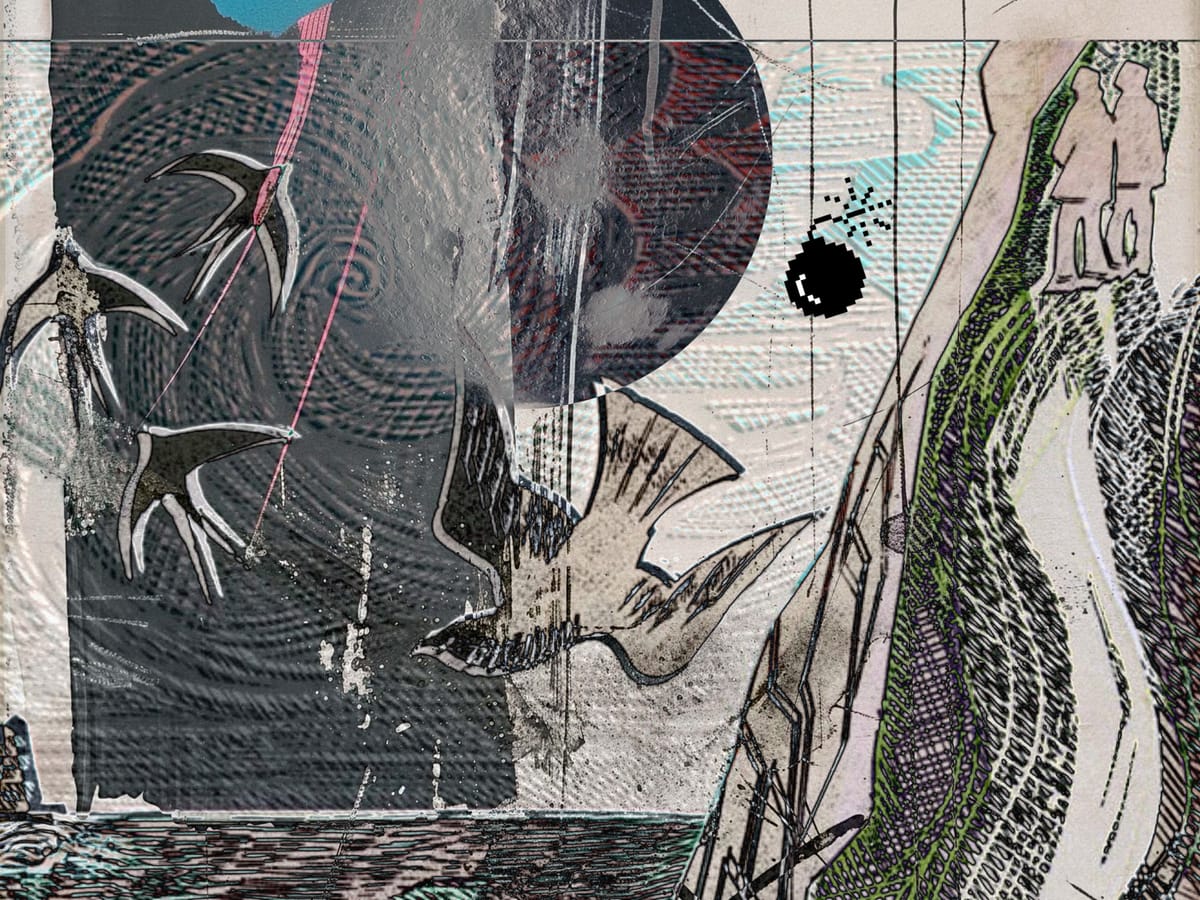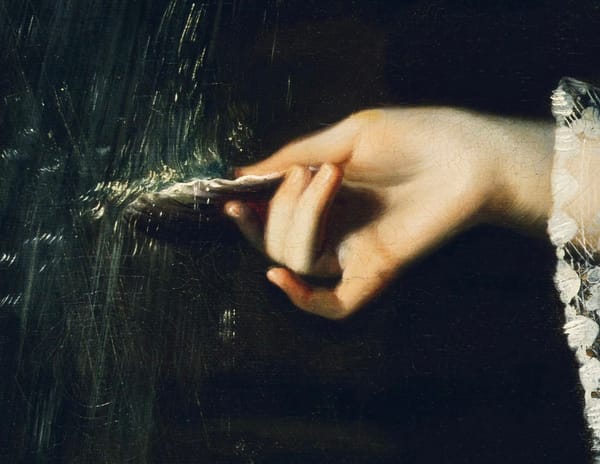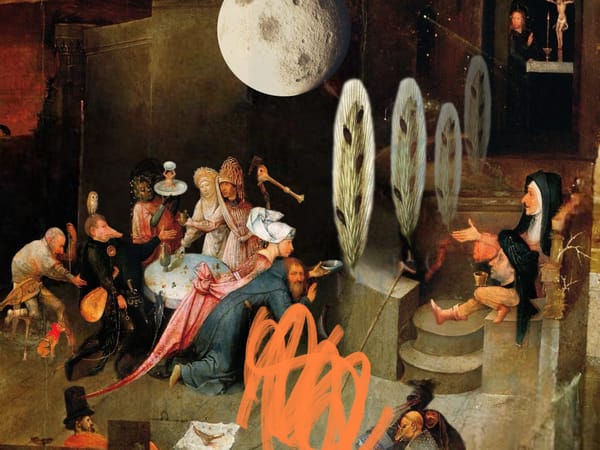On the Misery of Others: The Salt Path Scandal

At the beginning of the month, the British newspaper The Observer ran a damning expose of author Raynor Winn. Her memoir The Salt Path is a ‘true story’ of a couple made homeless through property investments gone bad. The book recalls their survival walking hundreds of miles while her husband Timothy, or “Moth” in the books, struggles with corticobasal degeneration, a fatal chronic illness.
The publishing industry expects pathography as inspiration porn--juicy victimhood redeemed.
Since its publication in 2018, The Salt Path sold over two million copies and birthed a franchise of books where the couple go on long walks in different scenic places, hoping to ‘cure’ Moth. The publication of the fourth book in the series, due out in October, has been postponed.
The Observer article reveals that Winn's actual name is Sally Ann Walker, and that she embezzled £64,000 from a former employer. At the time of their adventure in homelessness, the couple owned a property in France, still in their possession today. The article even calls into question Moth’s illness.
The Salt Path has always been a deeply ableist story. The redemptive narrative arc is especially toxic to those with chronic illness. 'Walking off' illness and the 'sleeping rough' cure--as The Salt Path proposes—is implausible and cruel. Yet, the success of this story is no surprise. The publishing industry expects pathography as inspiration porn--juicy victimhood redeemed.
Who doesn’t want a miracle, a triumph over the degeneration of the sick body and inevitable death? What if being cured is simply a question of attitude and right living? Cures involving positive thinking and mind-over-matter are the kind of poison Louise Hay, the author of Heal Your Body: The Mental Causes for Physical Illness and the Metaphysical Way to Overcome Them* and those like her, have disseminated. The Salt Path and the books that come after it propose that poverty and illness can be ameliorated by the right mindset and beautiful scenery—the will triumphs, love triumphs, and there is always a cure if you walk far enough.
At yet, there’s something fatalistic about Moth’s continued walking and sleeping rough, despite being in agony. While reading the books—and I have read them all—I often thought his unquestioning agreement to undertake these feats of endurance was not a plan for survival but a prolonged suicide attempt. The implication that he is healed by his ordeal is perhaps the most egregious lie of the books. It shouldn’t take an exposé to see this, but maybe it takes someone living with multiple, life long chronic illnesses to understand how absurd The Salt Path is.
The scandal of dishonest memoir is nothing new, but this particular ‘truth telling’ feeds the ableist notion that those of us living with chronic illness are fakers. As the British Labour government dismantles state support of disabled people, our survival becomes increasingly precarious. According to dominant ableist attitudes, ours is a culture of grifters. Lies at the heart of The Salt Path feed the myth that the homeless and chronically ill are scammers.
The Salt Path has haunted my own journey to publication, and the book made way for so many books like mine. In 2019, The Salt Path won the Royal Society of Literature’s Christopher Bland Prize, an award given to authors with first books that are published after the age of 50. Ashes and Stones had the honour of being short listed for this same prize last year. My book has lived in The Salt Path’s shadow, even before publication. While the book proposal for Ashes & Stones was at auction, interested publishers compared it to The Salt Path. One editor asked me to elaborate on my ‘identity as a victim.’ I was told by another that my book could be marketed like Winn’s books. I watched Winn’s journey attentively—were there lessons to be learned?
I never considered myself a memoirist. Originally Ashes & Stones was poetic psychogeography, history and folklore. I was told by publishing professionals that in order to sell Ashes & Stones, I would have to put myself in it, so I chose to tell the truth, but tell it slant.** Any memoirist knows this compromise—success in circuit lies. All memoirists create a persona that tells their tale, just like a fiction writer would. Some readers who have contacted me feel that they know me—sometimes intimately. Who they think I am is a projection, a collaboration between the speaker in the book and their own reading of it. While writing the book, I left people and things out, respecting the wishes of some who did not want to be mentioned. I also deliberately slanted some details in order to be closer to the truth. In Ashes & Stones, I revealed things I’ve told very few people, believing it necessary for the integrity of the narrative. There’s something merciless about the exposure of memoir; I now live with that.
Sceptre, my UK publisher, edited Ashes & Stones brilliantly and for this I am deeply grateful. My book went through a legal read and thorough fact-checking during the editing process; I don’t know if this was the case with Winn’s books. Though Winn’s problematic obscuring of the truth now seems villainous, I also feel for her. There were millions who wanted her grotesque story to be true, and she gave it to them.
Like Winn, I was in my fifties when the publishing industry offered me a deal. I wanted, finally, after decades writing for small presses with little or no pay, to be published by one of the Big Five--global media giants capable of marketing a book and offering an advance. I agreed to add memoir if it meant the book would sell. In the end, I think my vulnerability adds to the immediacy of the women's stories I tell In Ashes & Stones--I don't regret including it. I wonder what Winn was asked to add to the book in order to sell it? I am not defending her—but I wonder how much she invented because she really wanted her book to be published. She or her publisher knew the truth wouldn’t sell, so she lied.
I am at heart a fiction writer. I came of age when tell-all memoirs of drug and sex addiction, incest and sexual violence were the rage. I was writing confessional poetry my twenties, but found myself in an unsafe MFA program. I could no longer expose myself in my work, so I began to write narratives about others whose lives resembled my own. I believed that pliant and nuanced fictions could tell truths no memoir ever could. I still believe this. Maybe this is the crux of it: readers are hungry for authenticity, yet truth is uncomfortable. The Industry–now run on a venture capitalist model--isn't even looking in this direction.
These pedestals are high. When they turn to gibbets, they take others with them.
Part of the mythology of The Salt Path is that Winn wrote it down in a notebook called ‘Salted Blackberries’ and gave it to Timothy, or ‘Moth’ as a souvenir of their walk. The story goes, someone else insisted it should be a book—and the success just happened, with unassuming Winn thrust into meetings with bigwigs at publishing houses and the spotlight of awards and notoriety.
After four books, though, can we call bullsh*t? Anyone who survives the ordeal of publishing even one book has to really, really want be a published author. It is a Faustian bargain involving intense ambition and even greater luck. In my twenties I was close with a writer who went on to be a very famous memoirist indeed—also pursued by scandal. The cusp of her success came with a call from a Big Five publisher with a deal. She said—because it was spring—she would ‘fellate the Easter Bunny’ if it meant she would finally be published. I remember thinking at the time that I would never be like that, and I would look at success differently. If someone hadn’t made it, maybe it was just down to refusal: when the coney of opportunity presented themselves, they just said no.
Just like after the Neil Gaiman scandal broke, it is now easier to say I never liked the books. These pedestals are high. When they turn to gibbets, they take others with them. Readers highly invested in The Salt Path felt the characters were real because it was sold to them as a true story. The emotional pull of the book is Dickensian melodrama of the highest order: an innocent couple thrust into penury endures the callous disregard of an uncaring world even while love grows between them.
I’ve seen a lot of male pundits crowing about how they always thought the premise was iffy, but their wife/aunt/sister/mother loved it. Why is this gendered? Perhaps for some male readers, women nonfiction writers are questionable, anyway--whether we tell the truth or not. Melodrama has always been the secret language of women and marginalised genders. We have told stories full of magic and miracles, enduring love, from one to another, before anyone even thought to write them down. Beyond this philosophical notion, it’s also women who buy books—especially those written by women about women.
But why were so many taken in? The book sits in a collective blind spot that lies somewhere between sympathy, our love of fairy tale, and pity. The base sentimentality of books like The Salt Path allows us to indulge in the suffering of others while offering a palliative delusion on behalf of all those who are sick and poor. This fraudulent hope is meant for the misery of others—never our own.
*In the 1970s Louise Hay refused traditional medical treatment for her cervical cancer, attributing its onset to negative thoughts and unhealed trauma. She claims to have cured herself through forgiveness, reflexology and enemas. Her work expounded the idea that only those with a negative mindset are susceptible to disease.
Further Reading:
An essential take on the ableist double bind of the controversy, up at Long Covid Advocacy https://www.longcovidadvoc.com/post/the-choice-of-the-salt-path-inspiration-porn-or-malevolent-malingerer
Sally Ann Walker/Raynor Winn’s rebuttal to the charges, including clinic letters concerning her husband’s diagnosis: https://www.raynorwinn.co.uk/new-page
Great piece on the history of memoir & scandal in The Guardian https://www.theguardian.com/books/2025/jul/10/inside-the-salt-path-controversy-scandal-has-stalked-memoir-since-the-genre-was-invented
What's Next at Missives...🌚
Normally at the Waning Moon, I publish a round up of what I’m reading/watcing/planning. This is coming at the New Moon! This scandal was timely and my response took precedence.
If you enjoyed this post
If you got something out of this, let me know & leave a wee tip:
https://allysonshaw.ghost.io/#/portal/support
AND--if you are not already a paid subscriber, consider upgrading to a paid subscription by creating an account, clicking on the red 'account' button and choosing 'Change' next to Missives from the Verge. As a paid subscriber you will receive monthly, exclusive content like this and an invitation to our online salon, The Outlier Hour. Join us!




